| Srl | Item |
| 1 |
ID:
119965
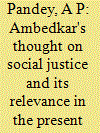

|
|
|
| 2 |
ID:
123655
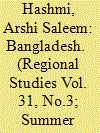

|
|
|
| 3 |
ID:
130027
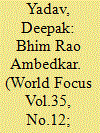

|
|
|
|
|
| Publication |
2014.
|
| Summary/Abstract |
Dr Ambedkar's legacy as a socio-political reformer had a deep effect on modern India. He believed that "political democracy without social democracy and economic justice is meaningless." In post-Independence India his socio-political thought has acquired respect across the political spectrum. His initiatives have influenced various spheres of life and transformed the way India today looks at socio-economic policies, education and affirmative action through socio-economic and legal incentives. His reputation as a scholar led to his appointment as free India's first law minister, and chairman of the committee responsible to draft a constitution. He passionately believed in the freedom of the individual and criticized equally both orthodox casteist Hindu society.
|
|
|
|
|
|
|
|
|
|
|
|
|
|
|
|
| 4 |
ID:
192891
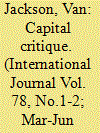

|
|
|
|
|
| Summary/Abstract |
Advocates of progressive political economy agree that the neo-liberal economic order has worsened environmental degradation, worker precarity, and oligarchy, but what are the alternatives? This article relates left-progressive discourses about concrete approaches and policy ideas to implications for the global economic order. While progressives explicitly seek a more social democratic global order, the various policy initiatives in the progressive imaginary implicitly involve approaches to order-building that are in scarcely acknowledged competition with one another. While neo-Keynesianism, justice for the Global South, a Global Green New Deal, and degrowth are all anti–neo-liberal approaches that pursue the same broad aims—reducing inequality within the Global North, raising standards of living and buffering structural violence in the Global South, and responding to the climate crisis—these goals potentially exhibit the tensions of a trilemma.
|
|
|
|
|
|
|
|
|
|
|
|
|
|
|
|
| 5 |
ID:
109507


|
|
|
| 6 |
ID:
076800
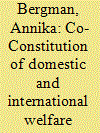

|
|
|
|
|
| Publication |
2007.
|
| Summary/Abstract |
Sweden's self-narrative is that of an outward-looking internationalist state whose commitments to justice and equality are not confined to co-nationals. What distinguishes Swedish internationalism, apart from being social democratically inspired, is that it rests on a thin conception of cosmopolitan duty that does not exclusively privilege the rights of Swedish nationals alone, but recognizes the need to extend social and political rights to non-nationals as well. Key here is the universality principle of the Nordic welfare model, which inspires policies that do not tend to discriminate on the basis of class or ethnic background. What is more, this way of thinking has not generally been confined to the domestic level, but can be traced through to Sweden's (and the other Nordic states') distinctive foreign policy traditions. This article examines the inter-connection between domestic and international welfare commitments in the Swedish context. The key thesis developed here is that states that promote the values of solidarity, inclusiveness and universal welfare at the national level are also more likely to do so beyond borders. The article deconstructs the endogenously framed ideational factors that underpin Swedish internationalism, with particular focus on social democracy in the process. It also investigates the co-constitutive relationship between Sweden's domestic and international welfare commitments by exploring contemporary discourses and practices that make up a significant part of Sweden's self-identity. Finally, it analyses the normative relevance of a social democratically inspired Swedish internationalism for the future of Nordic internationalism more generally.
|
|
|
|
|
|
|
|
|
|
|
|
|
|
|
|
| 7 |
ID:
080852
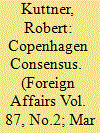

|
|
|
|
|
| Publication |
2008.
|
| Summary/Abstract |
Denmark has forged a social and economic model that couples the best of the free market with the best of the welfare state, transcending tradeoffs between dynamism and security, efficiency and equality. Other countries may not be able to simply copy the Danish model of social democracy, but it nonetheless offers important lessons for governments confronting the dilemmas of globalization.
|
|
|
|
|
|
|
|
|
|
|
|
|
|
|
|
| 8 |
ID:
118532
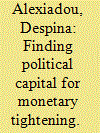

|
|
|
|
|
| Publication |
2012.
|
| Summary/Abstract |
How do governments find the political capital to raise interest rates in pursuit of inflation stabilisation? Against common wisdom, this article shows that the ability of governments to exercise tight monetary policy largely depends on the level of unemployment insurance. Unemployment insurance is particularly useful to social democratic parties since their core constituency - labour - is the hardest hit by economic downturns. Empirical evidence from 17 OECD countries over thirty years demonstrates that high levels of unemployment insurance present a strong incentive for social democratic governments to respond more aggressively to positive changes in inflation. These findings resolve the puzzle of why partisan monetary cycles are not often observed in the literature and have important policy implications, given continued calls for scaling down social insurance.
|
|
|
|
|
|
|
|
|
|
|
|
|
|
|
|
| 9 |
ID:
047100


|
|
|
|
|
| Publication |
Oxford, Clarendon Press, 2000.
|
| Description |
xxviii, 799p.Hbk
|
| Contents |
Vol. I.: The build-up of German Aggression.
|
| Standard Number |
019822866X
|
|
|
|
|
|
|
|
|
|
|
|
Copies: C:1/I:0,R:0,Q:0
Circulation
| Accession# | Call# | Current Location | Status | Policy | Location |
| 044365 | 940.540943/DEI 044365 | Main | On Shelf | General | |
|
|
|
|
| 10 |
ID:
112819
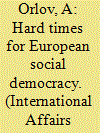

|
|
|
|
|
| Publication |
2012.
|
| Summary/Abstract |
THE 20TH CENTURY is commonly believed to be the golden age of Social Democracy even though the number of enthusiastic supporters is balanced out by the number of no less enthusiastic opponents of this idea. It is obvious, however, that the ideology and its vehicle - the socialist and social democratic parties - have figured prominently on the ideological and political scene of the contemporary world.
|
|
|
|
|
|
|
|
|
|
|
|
|
|
|
|
| 11 |
ID:
162400


|
|
|
| 12 |
ID:
107199
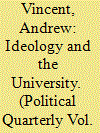

|
|
|
|
|
| Publication |
2011.
|
| Summary/Abstract |
Ideology underpins recent transformations of British universities; it forms an unquestioned backdrop to policy-making. The ideology at issue is a market-based neo-liberalism-accompanied by a doctrinaire private-sector managerialism. Universities employing this ideology envision it as common sense. The ideology is thus not proselytised, but rather structures the vernacular of university speech. In reality it is a highly politicised ideology masquerading as a managerial reality. Its effect on universities has been profoundly destructive. The dignified public good of higher education has now become a huckstering marketised mechanism. What is so perplexing is the quiescence of universities. The ideology is so hegemonic that it appears exempt from criticism. University administrators are now quite unapologetic ideological functionaries and we need to relearn how to criticise those who manage us. Ultimately no ideology lasts, this present one will be supplanted, the question is what level of damage to civil and intellectual life will it inflict?
|
|
|
|
|
|
|
|
|
|
|
|
|
|
|
|
| 13 |
ID:
111648


|
|
|
|
|
| Publication |
2012.
|
| Summary/Abstract |
This article makes the case for social democracy in the context of difficult national and international economic conditions and changes in domestic politics that see a Conservative-dominated Coalition government and the Labour party in Opposition for the first time since 1997. It rejects much current thinking in the Labour party and instead argues that traditional social democratic values, such as equality and social justice, are of contemporary relevance and can only be achieved through a strong central state committed to those values.
|
|
|
|
|
|
|
|
|
|
|
|
|
|
|
|
| 14 |
ID:
119964


|
|
|
| 15 |
ID:
062106
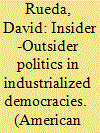

|
|
|
| 16 |
ID:
085012
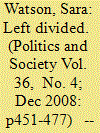

|
|
|
|
|
| Publication |
2008.
|
| Summary/Abstract |
This article challenges dominant explanations in the comparative political economy literature on the origins and purposes of social protection. Far from being a tool of working-class mobilization, social protection in southern Spain was strategically employed by a left party to politically demobilize its supposedly "natural" constituencies. This peculiar outcome is the result of a setting that is common in welfare states outside of northern Europe: the context of a divided left, in which parties and unions are seeking to mobilize different constituencies and in which left parties are themselves divided between moderate and far-left groups. The result in Spain was that social policy became a weapon in parties' efforts to undermine their political competition. This suggests the need to rethink the received wisdom about what the welfare state does to build working-class power in the context of a divided left
|
|
|
|
|
|
|
|
|
|
|
|
|
|
|
|
| 17 |
ID:
192890
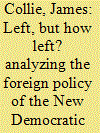

|
|
|
|
|
| Summary/Abstract |
This article analyzes the modern foreign policy of the New Democratic Party of Canada (NDP). It uses the framework of Aaron Ettinger's work in the International Journal on an emerging left-wing in the US Democratic Party. I first situate the research within the existing literature on leftist internationalism, Canadian foreign policy, and the New Democratic Party. I then analyze a dataset that I created based on the last five NDP federal election platforms and use it to analyze 210 different foreign policy commitments. I use these findings to argue two things: (1) the NDP has a comprehensive foreign policy that reflects dual struggles of electability and left-wing ideals; (2) there is no identifiable left-wing turn in recent NDP platforms. I conclude this article with a discussion on the future of NDP foreign policy.
|
|
|
|
|
|
|
|
|
|
|
|
|
|
|
|
| 18 |
ID:
102685


|
|
|
| 19 |
ID:
101095
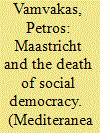

|
|
|
|
|
| Publication |
2010.
|
| Summary/Abstract |
The global financial crisis of 2009-2010 has further underscored the demise of social democracy as a legitimate political alternative, for example, due to an absence of a clearly articulated alternative approach to the crisis offered by Social Democratic parties, even though neoliberal deregulated markets have proven to be vulnerable to the corrupt and opaque practices that created a massive crisis of systemic confidence. The author contends that the Maastricht process has transformed the Western European party system away from parties based on ideology and toward catchall issue-oriented parties. For Socialist and Social Democratic parties, this has meant the end of the centrality of the welfare state in their ideological domain. However, other trends have been equally damaging. Unionization, which has been in decline since the 1980s, primarily because of the changing nature of the labor force in postindustrial societies, has been further affected by the Maastricht criteria, which sought to enhance the competitiveness through increasing productivity, reducing wage costs, and significantly restructuring the labor relations that organized labor had achieved. For Social Democratic parties, the changing demographic of its support base, the ideological collapse of the Soviet Union, the adoption of the Maastricht convergence agenda, and the rise of a debt-infused consumer culture has meant death.
|
|
|
|
|
|
|
|
|
|
|
|
|
|
|
|
| 20 |
ID:
119968
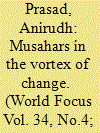

|
|
|